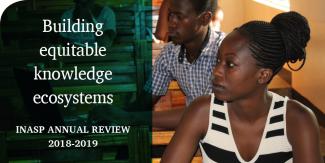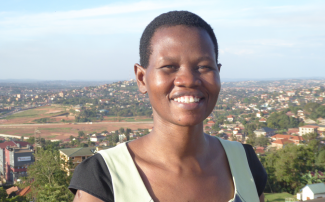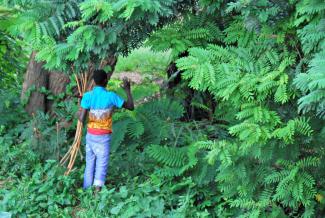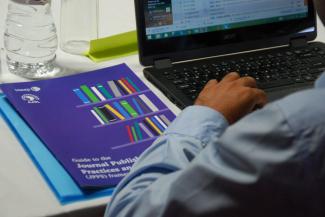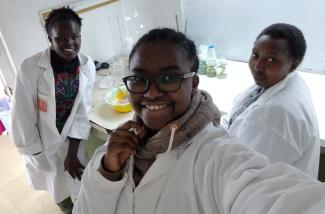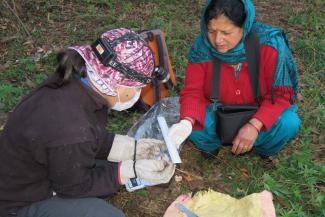This year, our annual review reflects on highlights from across our work to help improve equity in research and knowledge ecosystems. Download our overview of the year and scroll below for further thought pieces, reflections and video interviews with staff and partners.
Reviewing our past to find our future
As an introduction to INASP’s annual review 2018-19, Executive Director John Young and Chair of the Board Jo Beall reflect on programme work over the past year and what we have learnt from it as an organization to feed into future plans.
For a long time INASP's mission has been to increase the visibility, capacity and involvement of scholars in the South and particularly scholars who might be overlooked even within their own countries.
Jo Beall, INASP's Chair of the Board
Thought pieces
INASP staff reflect on key approaches, lessons and ideas that have emerged over the last year.
Realizing visions for strong and equitable national research systems
Over the course of late 2018 and early 2019, INASP and national partners convened a series of dialogue events to consider what is needed for equitable research systems in those countries and beyond.
Why does it work? – INASP’s approach to online learning
For more than five years, online learning has been an integral part of INASP’s capacity development approaches. Joanna Wild reflects on the role of technology in capacity development and how we go about learning design.
Gender responsive programming: the global gender gap in the context of East African higher education
Jennifer Chapin reflects on what being gender responsive means in working with higher education to improve employability in Tanzania and Uganda.
Enabling gender parity in higher education and the research sector: Learning from East Africa
Over the last year, INASP has been gathering learning with a number of its partners in three countries – Ethiopia, Tanzania and Uganda – to identify, explicitly, what needs to be done within the higher education and research sector to address the issue of gender parity in a systemic way and permanent way. Femi Nzegwu shares some of our learning.
Change in East African higher education: Reflections on the first year of the TESCEA partnership
Significant change often seems hard to achieve in higher education but the Transforming Employability for Social Change in East Africa partnership of East African organizations has had some real successes. Jon Harle reflects on the key elements of the partnership. Watch the video
Supporting access to global information and evidence
Our approach to supporting access to information has evolved over the course of our 25-year history in response to changing needs and opportunities. As needs continue to evolve, Anne Powell and Jon Harle explain why INASP must ensure that our thinking evolves too.
Good relationships are at the heart of good monitoring, evaluation and learning
Learning systematically about what works is fundamental to putting research and knowledge at the heart of development. Femi Nzegwu shares some emergent thinking from monitoring, evaluation and learning (MEL) work we have been involved in over recent years, within INASP and beyond.
Highlights
We share some highlights from our programme work in 2018/19.
HIGHER EDUCATION: New partnership supports employability for social change in East Africa
Launched in 2018, the Transforming Employability for Social Change in East Africa (TESCEA) partnership is helping young people in Tanzania and Uganda to use their skills and ideas to tackle social and economic problems.
EVIDENCE: ‘Context Matters’ framework for improving evidence use: what do policymakers and practitioners think about it?
Evidence-informed public policy is vital to equitable development, and public agencies must maximize their use of evidence and understand the contextual factors constraining and facilitating its uptake. INASP and Politics & Ideas produced the Context Matters Framework in 2016, to help government organizations improve their use of evidence for policy making. Last year, we put the framework into practice in Peru and Ghana.
JOURNAL QUALITY: Assessing and supporting journal publishing practices in the Global South
Journals in the developing world face challenges in becoming known and respected in the international research landscape. Journal Publishing Practices and Standards (JPPS), established and managed by African Journals Online (AJOL) and INASP, has now assessed over 900 Southern journals and was a finalist for a scholarly publishing award.
RESEARCH COMMUNICATION: Platforms to support strong and equitable research and knowledge
Global platforms supporting the production, sharing and use of research and knowledge underpin INASP's work.
RESEARCH COMMUNICATION: Online journal clubs spark active discussions and new ways of exploring literature
New journal clubs, with facilitators from Africa and Central America, are building on the strong foundations of social learning in the AuthorAID project.
The journal club for me is an exciting space to interact with scholars from various places and skills. Given the number of people who joined the clubs it shows people want to learn, they want to grow their skills and knowledge in research.
Aurelia Munene
RESEARCH UPTAKE: Making connections to improve research uptake
A comprehensive approach to research uptake is needed researchers, research donors and other stakeholders to maximize the usefulness and use of research

